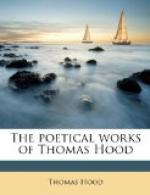So runs the story,
And, in vain self-glory,
Some Saints would sneer at Gubbins for his blindness—
But what the better are their pious saws To ailing
souls, than dry hee-haws,
Without the milk of human kindness?
TO MY DAUGHTER[16]
ON HER BIRTHDAY.
[Footnote 16: Written at Ostend in September 1839.]
Dear Fanny! nine long years ago,
While yet the morning sun was low,
And rosy with the Eastern glow
The landscape smiled—
Whilst lowed the newly-waken’d herds—
Sweet as the early song of birds,
I heard those first, delightful words,
“Thou hast a Child!”
Along with that uprising dew
Tears glisten’d in my eyes, though few,
To hail a dawning quite as new
To me, as Time:
It was not sorrow—not annoy—
But like a happy maid, though coy,
With grief-like welcome even Joy
Forestalls its prime.
So mayst thou live, dear! many years,
In all the bliss that life endears,
Not without smiles, nor yet from tears
Too strictly kept:
When first thy infant littleness
I folded in my fond caress,
The greatest proof of happiness
Was this—I wept.
MISS KILMANSEGG AND HER PRECIOUS LEG.[17]
[Footnote 17: Originally published by instalments in Colburn’s New Monthly Magazine in 1840 and 1841, as one of a proposed series to be entitled “Rhymes for the Times.”]
A GOLDEN LEGEND.
“What
is here?
Gold! yellow, glittering, precious
gold?”
Timon
of Athens.
HER PEDIGREE.
I.
To trace the Kilmansegg pedigree
To the very root of the family tree
Were a task as rash as ridiculous:
Through antediluvian mists as thick
As London fog such a line to pick
Were enough, in truth, to puzzle old Nick,
Not to name Sir Harris Nicolas.
II.
It wouldn’t require much verbal strain
To trace the Kill-man, perchance, to Cain;
But, waiving all such digressions,
Suffice it, according to family lore,
A Patriarch Kilmansegg lived of yore,
Who was famed for his great possessions.
III.
Tradition said he feather’d his nest
Through an Agricultural Interest
In the Golden Age of Farming;
When golden eggs were laid by the geese,
And Colehian sheep wore a golden fleece,
And golden pippins—the sterling kind
Of Hesperus—now so hard to find—
Made Horticulture quite charming!
IV.
A Lord of Land, on his own estate,
He lived at a very lively rate,
But his income would bear carousing;
Such acres he had of pastures and heath,
With herbage so rich from the ore beneath,
The very ewe’s and lambkin’s teeth
Were turn’d into gold by browsing.




